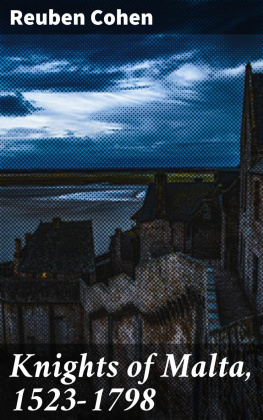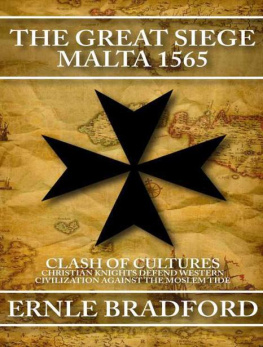CHAPTER I
SETTLEMENT AT MALTA, 15231565
Departure from RhodesResidence in ItalySettlement in
Malta, 1530Condition of the MediterraneanThe
corsairsTurkeyFortification of MaltaLoss of English
"Langue"Enterprises of the OrderSolyman decides to attack Malta
CHAPTER II
THE SIEGE OF MALTA, 1565
PreparationsSize of opposing forcesSiege of St. ElmoArrival of
DragutCapture of St. Elmo, June 23Death of DragutSiege of main
fortressesGreat losses on both sidesArrival of reinforcements from
SicilyTurks evacuate island
CHAPTER III
THE CONSTITUTION OF THE ORDER OF ST. JOHN
Classes in the OrderLanguesChapter-GeneralCouncilsGrand
MasterBishop of MaltaFinancesJusticeCriminal CouncilCourt of
gardThe Hospital
CHAPTER IV
THE DECLINE, 15651789
Decadence of TurkeyKnights become anachronismValettabuiltFortifying the islandDisturbances in the OrderQuarrelswith different PowersTreatment of the MalteseBuildings inValettaPapal interferenceNaval operationsIndependence of theOrder
CHAPTER V
THE FALL, 17891798
Attacks on the Order during the French RevolutionFrenchestates confiscatedPoverty of the OrderTsar Paul I.FrenchschemesNapoleon appears off MaltaCondition of the islandItscaptureDispersion of the Order
APPENDIX I.
APPENDIX II.
BOOKS CONSULTED
NOTE ON THE AUTHORITIES
CHAPTER I
Table of Contents
SETTLEMENT AT MALTA 15231565.
On January 1, 1523, a fleet of fifty vessels put out from the harbourat Rhodes for an unknown destination in the West. On board were theshattered remnants of the Order of St. John of Jerusalem, accompaniedby 4,000 Rhodians, who preferred the Knights and destitution tosecurity under the rule of the Sultan Solyman. The little fleet wasin a sad and piteous condition. Many of those on board were wounded;allKnights and Rhodians alikewere in a state of extreme poverty.For six months they had resisted the full might of the Ottoman Empireunder its greatest Sultan, Solyman the Magnificent; Europe had lookedon in amazed admiration, but had not ventured to move to its rescue.Now they were leaving the home their Order had possessed for 212years, and were sailing out to beg from Christendom another stationfrom which to attack the infidel once again.
The Knights of Rhodesas they were called at the timewere theonly real survivors of the militant Order of Chivalry. Two centuriesearlier their great rivals, the Templars, had been dissolved, and alarge part of their endowments handed over to the Hospitallers. Thegreat secret of the long and enduring success of the Order of St. Johnwas their capacity for adapting themselves to the changing needs ofthe times. The final expulsion of the Christians from Syria had leftthe Templars idle and helpless, and the loss of the outlets for theirenergy soon brought corruption and decay with the swift consequence ofdissolution. All through the history of the great Orders we findthe Kings of Europe on the lookout for a chance to seize theirpossessions: any excuse or pretext is used, sometimes mostshamelessly. An Order of Knighthood that failed to perform the dutiesfor which it was founded was soon overtaken by disaster.
The Hospitallers had realised, as early as 1300, that their formerrle of mounted Knights fighting on land was gone for ever. From theirseizure of Rhodes, in 1310, they became predominantly seamen, whoseflag, with its eight-pointed cross, struck terror into every infidelheart. Nothing but a combination of Christian monarchs could cope withthe superiority of the Turk on land: by sea he was still vulnerable.The Knights took up their new part with all their old energy anddetermination: it is but typical that henceforward we never hear ofthe "Knights" of Malta fighting as cavalry.
After various adventures the fleet found itself united at Messina,whence it proceeded to Baiae. The election to the papacy of theCardinal de' Medicione of their own Orderas Clement VII., gave theKnights a powerful protector. He assigned Viterbo as a residence forthe Order till a permanent home had been discovered.
Villiers de L'Isle Adam, Grand Master of the Order, was faced withmany difficulties. Remembering the fate of the Templars, he was afraidthat the Order would disperse, and its present helpless condition wassurely tending to disintegration. At this time the war between CharlesV. and Francis I. was at its height, and the quarrel between Franceand Spain was reflected within the ranks of the Hospitallers. As theFrench and Spanish Knights formed the greater part of the members, theunity of the Order was threatened by the quarrels between themthat arose out of national sentiment. The Reformation was rapidlyspreading, and was likely to prove dangerous to the lands of the Orderin Northern Europe, and various monarchs were meditating the seizureof the Hospitallers' estates now that the Order was temporarilywithout a justification for its existence.
The Grand Master showed himself a skilful diplomat, as well as a bravesoldier. From 1523 to 1530 the Order remained without a home, whileL'Isle Adam visited the different European courts to stay the graspinghands of the various Kings. All this time negotiations were proceedingbetween Charles V. and the Knights for the cession of Malta. Theharsh conditions which the Emperor insisted upon in his offer madethe Knights reluctant to accept, while his preoccupation with the waragainst France made negotiations difficult. Further, the cause ofthe Knights had been damaged when the Popewho had acted as theirintercessorjoined the ranks of Charles's enemies, and ClementVII. was now a prisoner in the Emperor's hands. In March, 1530, anagreement was finally arrived at, which was the most favourablethe Emperor would grant. One harassing burden the Knights could notescape: Charles insisted that Tripoli must go with Malta, a gift whichmeant a useless drain upon their weak resources, and which fellin 1551 to Dragut-Reis and the Turkish forces at the first seriousattack. L'Isle Adam had insisted that he could not take the islandover as a feudatory to the King of Spain, as that was contrary to thefundamental idea of the Orderits impartiality in its relations toall the Christian Powers. The only condition of service, therefore,that was made was nominal: the Grand Master henceforth was to send, onAll Souls' Day, a falcon to the Viceroy of Sicily as a token of feudalsub-mission.[1]
This was a splendid bargain for the Emperor. Malta had hitherto beenworthless to him, but henceforth it became one of the finest bulwarksof his dominions. To understand the supreme value of the island, wemust take a glance at sea power in the Mediterranean in the sixteenthcentury.
The beginning of the century had seen the growth of the Corsairs'strength to a most alarming extent. While all the European Powers werefighting among themselves, these Barbary Corsairs (as they were latercalled) had become the terror of the Western Mediterranean. Spain, byits unrelenting persecution of the Moriscoes, following on centuriesof bitter conflict between Christian and Mussulman, had earned theundying hatred of the dwellers on the North African coast, many ofwhom were the children of the expelled Moors. These Moors had wastedtheir energy in desultory warfare up to the beginning of the sixteenthcentury, when the genius of the two brothers, Uruj and Khair-ed-DinBarbarossa, had organised them into the pirate State of Algiers, whichwas to be a thorn in the side of Christendom for over three centuries.The Corsairs were not content with merely attacking ships at sea: theymade raids on the Spanish, Italian, and Sicilian sea-boards, burningand looting for many miles inland. The inhabitants of these parts weredriven off as captives to fill the bagnios of Algiers, Tunis, Bizerta,and other North African towns. These prisoners were used as galleyslaves, and the life of a galley slave was generally so short thatthere was no difficulty of disposing of all the captives that couldbe seized. Cupidity, allied with fanaticism, gave this state of war acruelty beyond conception: both sides displayed such undaunted courageand such fierce personal hatred as to make men wonder, even inthat hard and bitter century. Those low-lying galleys, which wereindependent of the wind, were ideal pirates' craft in the gentleMediterranean summer, and many a slumbering Spanish or Italian villagewould be startled into terror by their sudden approach. The audacityof their methods is illustrated by the raid on Fundi in 1534,when Barbarossa swooped down on that town simply to seize GiuliaGonzagareputed the loveliest woman in Italyfor the Sultan's harem:the fair Duchess of Trajetto hardly escaped in her nightdress.










